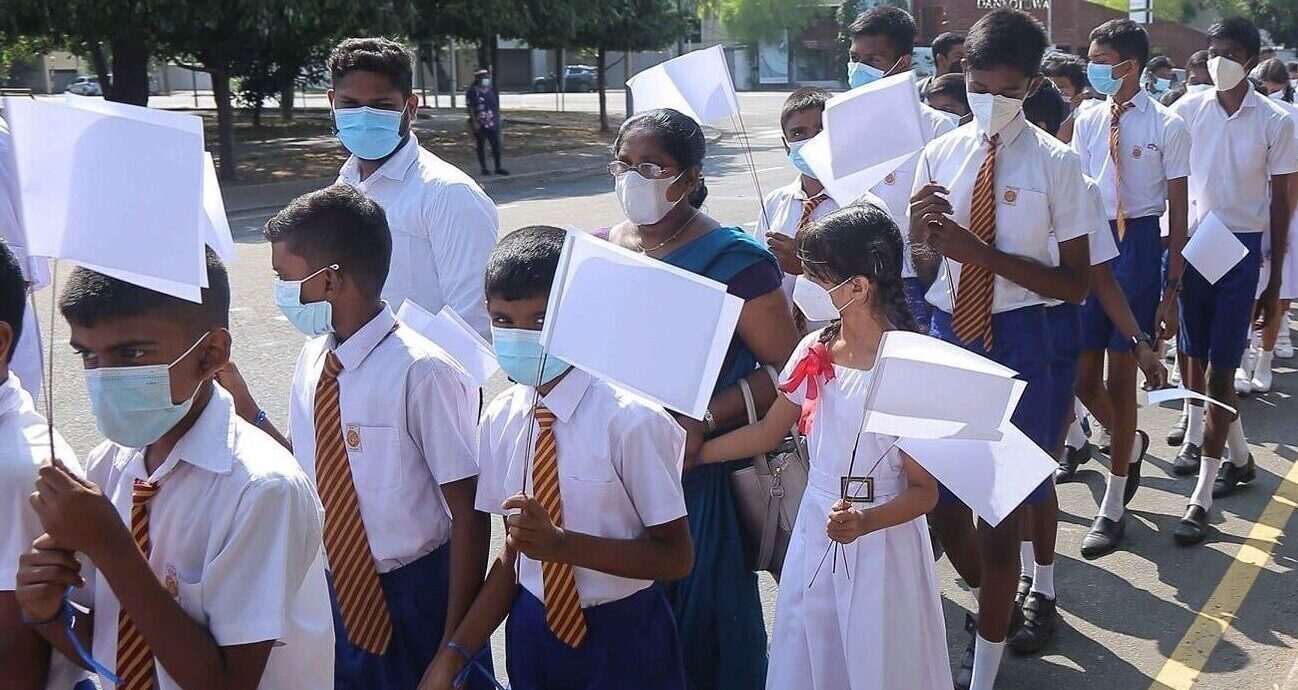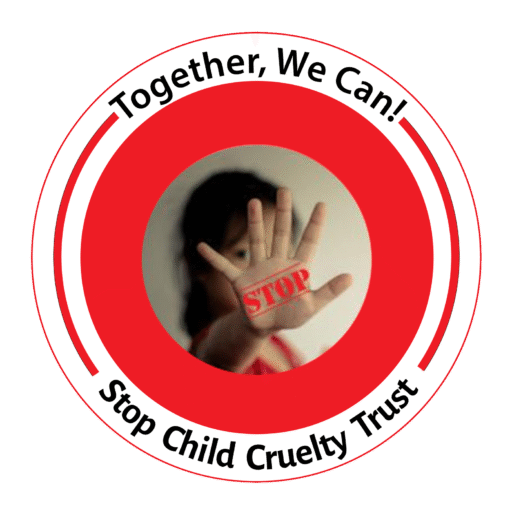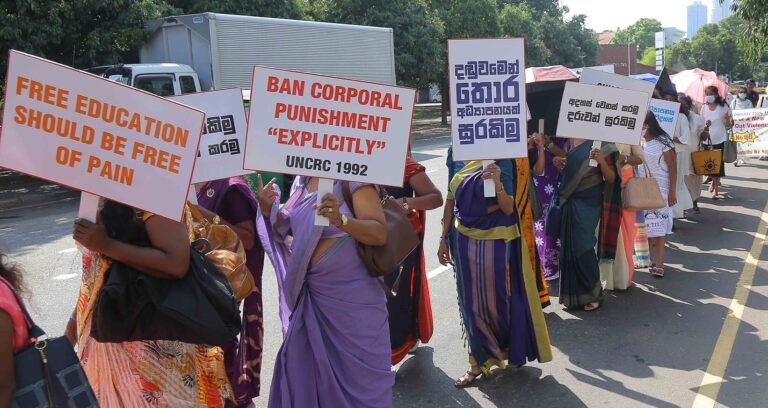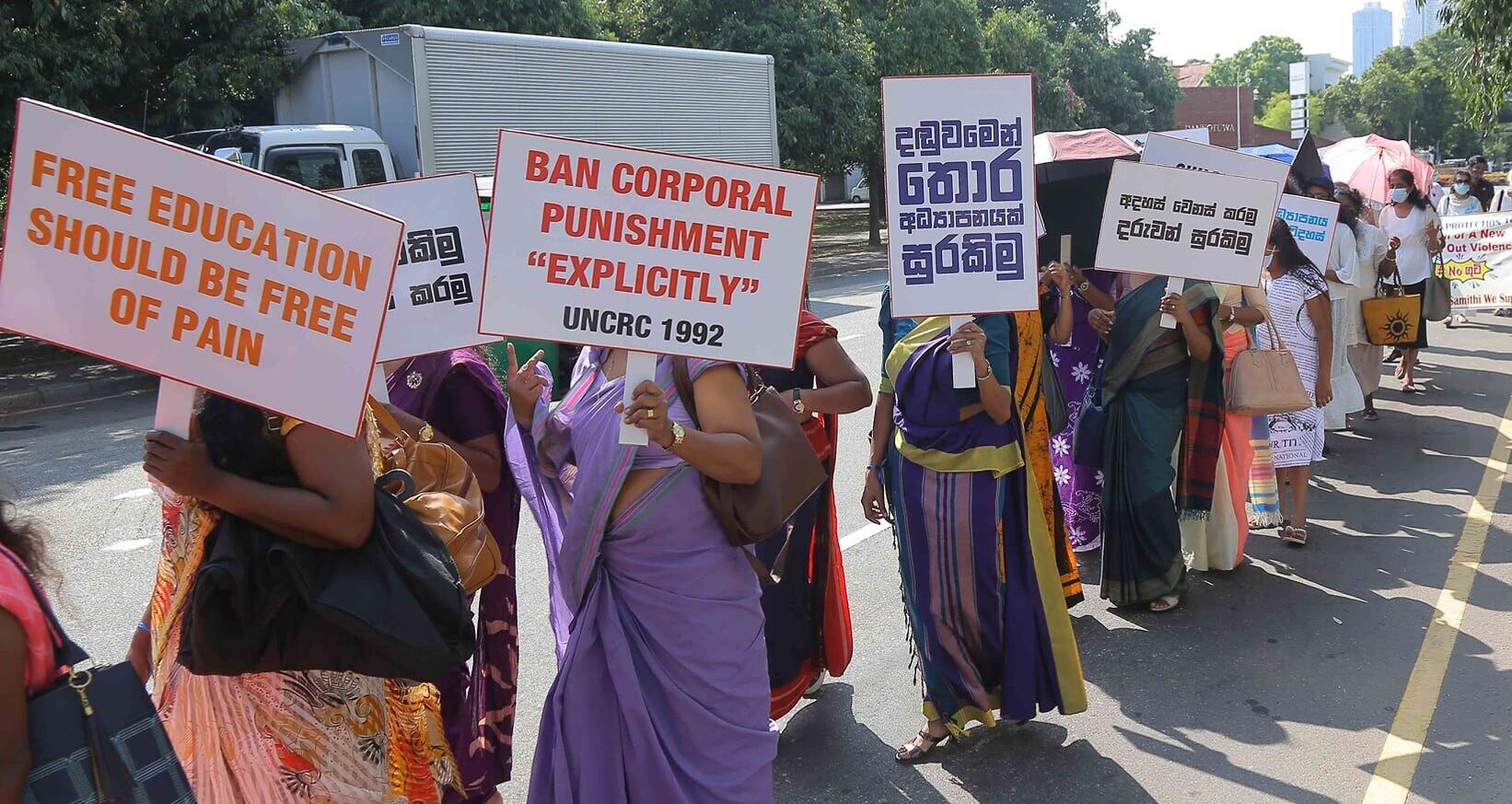Stop Child Cruelty Trust launched two petitions, which were hugely successful in attracting public support on protecting and promoting child rights in Sri Lanka
Stop Child Cruelty Trust launched two petitions, which were hugely successful in attracting public support on protecting and promoting child rights in Sri Lanka
Stop Child Cruelty Trust launched two petitions, which were hugely successful in attracting public support on protecting and promoting child rights in Sri Lanka.
A Study on Child Disciplinary Methods Practiced in Schools in Sri Lanka by the National Child Protection Authority in 2017 revealed that nearly 60% of teachers were unaware of positive discipline methods. These are teachers participating in a walk demanding to end corporal punishment in schools.
- Petition launched on:
12th September 2018
- Number of signatures:
over 5000 (on-line and physical signatures)
Sri Lanka ratified the United Nations Convention on the Rights of the Child (UNCRC) in 1992. Since then, there have been 6 parliamentary elections, 9 prime ministers, and 4 executive presidents.However, despite the many pledges made by successive governments and a plethora of proposals, the National Action Plan for the Promotion of Human Rights 2011-2016, pledging a ban on corporal punishment; and circulars by the Ministry of Education in 7/2005, 12/2016, and 12/2016, corporal punishment is rampant. in schools.
End Corporal Punishment in Schools in Sri Lanka Vision 2020 :
End Corporal Punishment in Schools in Sri Lanka Vision 2020 :
- Petition launched on:
12th September 2018
- Number of signatures:
over 5000 (on-line and physical signatures)
Sri Lanka ratified the United Nations Convention on the Rights of the Child (UNCRC) in 1992. Since then, there have been 6 parliamentary elections, 9 prime ministers, and 4 executive presidents. However, despite the many pledges made by successive governments and a plethora of proposals, the National Action Plan for the Promotion of Human Rights 2011-2016, pledging a ban on corporal punishment; and circulars by the Ministry of Education in 7/2005, 12/2016, and 12/2016, corporal punishment is rampant in schools.
A Study on Child Disciplinary Methods Practiced in Schools in Sri Lanka by the National Child Protection Authority in 2017 revealed that nearly 60% of teachers were unaware of positive discipline methods. These are teachers participating in a walk demanding to end corporal punishment in schools.
End Corporal Punishment in Schools in Sri Lanka Vision 2020 :
- Petition launched on:
12th September 2018
- Number of signatures:
over 5000 (on-line and physical signatures)
Sri Lanka ratified the United Nations Convention on the Rights of the Child (UNCRC) in 1992. Since then, there have been 6 parliamentary elections, 9 prime ministers, and 4 executive presidents.However, despite the many pledges made by successive governments and a plethora of proposals, the National Action Plan for the Promotion of Human Rights 2011-2016, pledging a ban on corporal punishment; and circulars by the Ministry of Education in 7/2005, 12/2016, and 12/2016, corporal punishment is rampant in schools.
A Study on Child Disciplinary Methods Practiced in Schools in Sri Lanka by the National Child Protection Authority in 2017 revealed that nearly 60% of teachers were unaware of positive discipline methods. These are teachers participating in a walk demanding to end corporal punishment in schools.
Keep Dirty Cops Off Sri Lanka’s Child Protection Services:
A Study on Child Disciplinary Methods Practiced in Schools in Sri Lanka by the National Child Protection Authority in 2017 revealed that nearly 80% of students are subjected to at least one episode of corporal punishment during one school term. Students walk in solidarity, requesting greater protection.
- Petition launched on:
11th June 2020
- Number of Signatures:
over 2000 (on-line and physical signatures)
.
Child protection in Sri Lanka is a national crisis. In addition to the abuse of children by gruesome individuals, there is an increase in the violation of children’s rights by officers of the Sri Lanka Police.On 25/05/2020, an autistic 14-year-old boy from Darga Town,Kalutara, was assaulted by police, visible on video recording, and was later denied by investigating officers. On 06/06/2020, another 14-year-old boy was unlawfully detained by Elpitiya police as ransom until his father appeared.

A Study on Child Disciplinary Methods Practiced in Schools in Sri Lanka by the National Child Protection Authority in 2017 revealed that nearly 60% of teachers were unaware of positive discipline methods. These are teachers participating in a walk demanding to end corporal punishment in schools.
- Petition launchedon:
12th September 2018
- Number of signatures:
Over 5000 (on-line and physical signatures)
Sri Lanka ratified the United Nations Convention on the Rights of the Child (UNCRC) in 1992. Since then, there have been 6 parliamentary elections, 9 prime ministers, and 4 executive presidents. However, despite the many pledges made by successive governments and a plethora of proposals, the National Action Plan for the Promotion of Human Rights 2011-2016, pledging a ban on corporal punishment; and circulars by the Ministry of Education in 7/2005, 12/2016, and 12/2016, corporal punishment is rampant. in schools.
End Corporal Punishment in Schools in Sri Lanka Vision 2020 :

A Study on Child Disciplinary Methods Practiced in Schools in Sri Lanka by the National Child Protection Authority in 2017 revealed that nearly 80% of students are subjected to at least one episode of corporal punishment during one school term. Students walk in solidarity, requesting greater protection.
- Petition launched on:
11th June 2020
- Number of Signatures:
over 2000 (on-line and physical signatures)
.
Child protection in Sri Lanka is a national crisis. In addition to the abuse of children by gruesome individuals, there is an increase in the violation of children’s rights by officers of the Sri Lanka Police.On 25/05/2020, an autistic 14-year-old boy from Darga Town,Kalutara, was assaulted by police, visible on video recording, and was later denied by investigating officers. On 06/06/2020, another 14-year-old boy was unlawfully detained by Elpitiya police as ransom until his father appeared.
Keep Dirty Cops Off Sri Lanka’s Child Protection Services:
Keep Dirty Cops Off Sri Lanka’s Child Protection Services:
A Study on Child Disciplinary Methods Practiced in Schools in Sri Lanka by the National Child Protection Authority in 2017 revealed that nearly 80% of students are subjected to at least one episode of corporal punishment during one school term. Students walk in solidarity, requesting greater protection.
- Petition launched on:
11th June 2020
- Number of Signatures:
over 2000 (on-line and physical signatures)
.
Child protection in Sri Lanka is a national crisis. In addition to the abuse of children by gruesome individuals, there is an increase in the violation of children’s rights by officers of the Sri Lanka Police.On 25/05/2020, an autistic 14-year-old boy from Darga Town,Kalutara, was assaulted by police, visible on video recording, and was later denied by investigating officers. On 06/06/2020, another 14-year-old boy was unlawfully detained by Elpitiya police as ransom until his father appeared.


